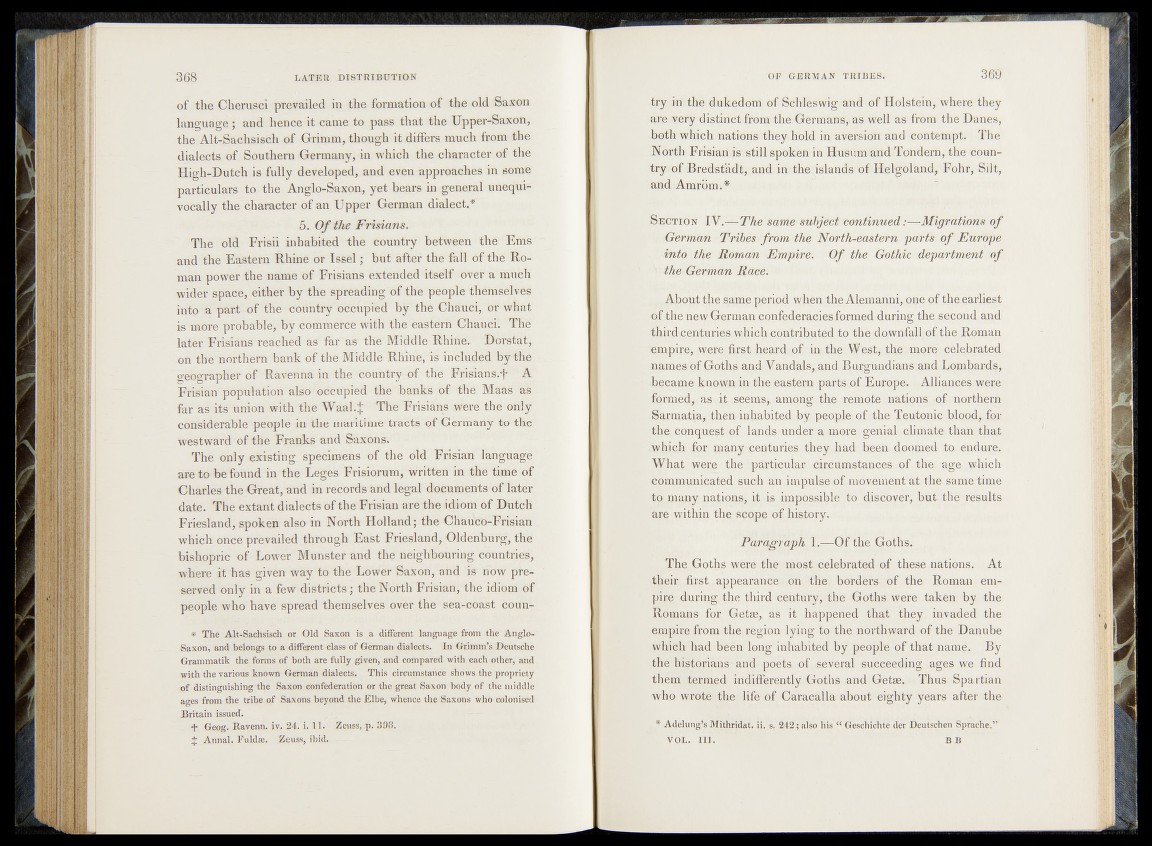
of the Cherusci prevailed in the formation of the old Saxon
language | and hence it came to pass that the Upper-Saxon,
the Alt-Sachsisch of Grimm, though it differs much from the
dialects of Southern Germany, in which the character of the
High-Dutch is fully developed, and even approaches in some
particulars to the Anglo-Saxon^ yet hears in general uneqht*
vocally the character of an Upper German dialect.*
3. O f the Frisians.
The old Frisii inhabited the country between the Ems'
and the Eastern Rhine or Isse l; but after the fall of the Roman
power the name of Frisians extended itself over a much
wider space, either by the spreading óf the people themselves
into a part of the country occupied by the Chauci, or what
is more probable, by commerce with the eastern Chauci! The
later Frisians reached as far as the Middle Rhine. Dorstat,
on the northern bank of the Middle Rhine,'is' included by th e
geographer of Ravenna in the country of the Frisian s.-f- A
Frisian population also occupied the banks of the Maas as
far as its union with the Waal.J The Frisians were the only-
considerable people in the maritime tracts of Germany to the
westward of the Franks and Saxons.
The only existing specimens of the old Frisian languagé
are to be found in the Leges Frisiorum, written in the time of
Charles the Great, and in records and legal documents of later
date. The extant dialects of the Frisian are the idiom óf Dutch
Friesland, spoken also in North Holland- the^Chan@0?Friisian
which once prevailed through East Friesland, Oldenburg, the
bishopric of Lower Munster and the neighbouring countries,
where it has given way to the Lower Saxon, and is ndw" preserved
only in a few districts; the North Frisian, the idiom of
people who have spread themselves over the sea-coast coun-
* The Alt-Sachsisch or Old Saxon is a different language from the Anglo-
Saxon, and belongs to a different class of Oerman dialects. In Grimm’s Deutsche
Grammatik the forms of both are fully given, and compared with each other, and
with the various known German dialects. This circumstance shows the propriety
of distinguishing the Saxon confederation or the great Saxon body of the middle
ages from the tribe of SaxoRS beyond the Elbe, whence theSaxons who colonised
^Britain issued.
■f Geog. Ravenn. iv, 24. i. 11. Zeuss, p . 3 9 8 .
+ Annal. Fuldse. Zeuss, ibid- -
-tpy in the dukedom of Schleswig and of Holstein, where they
are very distinct from the-Germans, as, well as from the Danes,
-feth whifch nationstt$tey hold in aversion and‘Gontempt. The
North Frisian,is istilfospoken in Hu$iim and Tondern, the country
of Bredstadt, and in therislands’,of Helgoland, Fohr, Silt,
and Amrdm.*
.Section IV.— The samesubjectcontinhid^SMigrations o f
vr German Tribes from, the NOrih^eastdrn parth o f Europe
into th& Roman Empire. Of the Gothic ^department o f
V the German Race: *•
at?. About tirefs|ipap p&ripd|- when the Aiemannfeome qf tjie earliest
of Me hpw German confederacies formed during,,^hei^ f p pd and
thirdcentur^A^liphpontribYutedstP thefd^wnfal^^^e^Roman
umpire., .wereffirst heard of; in the \^ ‘est^|hp.,,morq^eel^brated
na:mes|df fjoth^ and'Afanddls,.and Buijgi^dians and Lombards,
ifecamCi. k noyvu irpthy ^itsfegn p'artgio^EpiiOpe., ^Allianc,esyy||spi’
it^seea^jumongtjithft; ^emu|.e^naripn^of northern
t^armatia,,f blqpd,, for
phe conquest lands under, a.^norem^Sab*qlimate, than th^ti
„which fpy,piany-jeepturies,tbey^diad .been..d^tpfieff ^y^doare.
What were the ^p'Stieulw^ circnm stanofesakf, .thei^ ta awhich
Ipmrnunijcated such an^^pul^o^paip^steent at the,.^pmetime
to tinany, nations, it is impossible’ to discbyer, but^th0yesults
-are within thepscope of history. .
Paragraph 1 .—OfmaGoths.
The Goths were the most .celebrated of-these natidn^pAt
their first, appearahie^bn thef bepd||s^fefi‘the’r Uni-usm eni=-
pire during the third century, iro&-^G@^h^4weT'c taken by the
Romans for Getas, aV it happened that they invaded' the
empire from thei^egiqnyly^g^fe^heYhQrthward ©f' the Danube
which had bhenlong iw a b l^ o n y be6p%fef thdt!fi|dne. By
the historians" and pdefs^Oj^several supce^feg, ia^es we find^
them termed indifferentlyUoths anfftfetae. Thus Spartian
who wrote* the life of/Garac&lla about^ei^hty years after the
^*,Adelung’s Mithridat. ii/s.' 242; also fils'“ peschicfite der Deutschen Sprache.”
VOL. III. B B